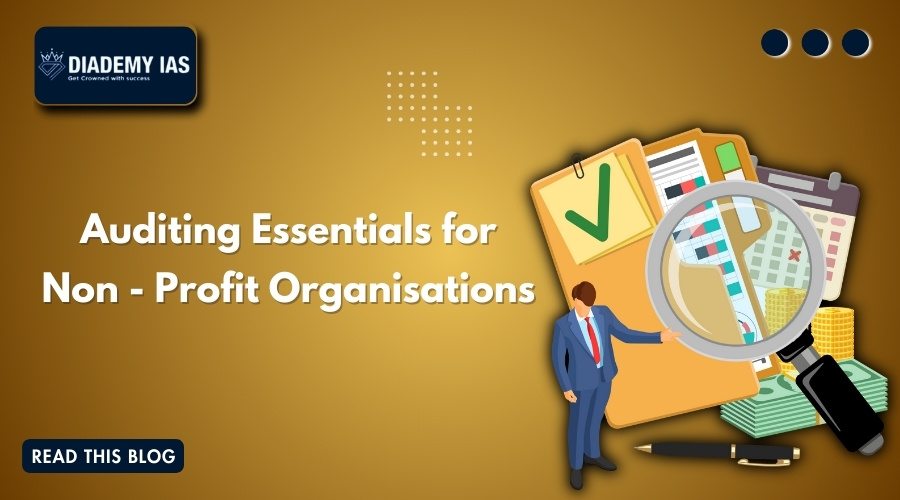Auditing the Accounts of a Non - Profit Organization
Learn about the importance of auditing accounts for non-profit organizations. Roles and Responsibilities of an Auditor. Steps to Prepare for a Nonprofit Audit.

Diademy IAS
Best Coaching for Commerce and Accountancy Optional
Table of Contents
Introduction: Understanding Nonprofit Audits
Nonprofit audits are an important part of how nonprofit organizations keep track of their money. Think of an audit like a health check-up for a nonprofit's finances. Just like a doctor checks if you're healthy, an audit checks if a nonprofit is managing its money properly. This helps ensure that the organization is spending its funds wisely and is being open about its financial activities.
Diademy IAS
Best Coaching for Commerce and Accountancy Optional
A financial review is when experts look closely at a nonprofit's financial documents. This review helps the organization understand how well it is doing with its money. For nonprofits, being transparent means being honest and clear about where their money comes from and how it is spent. This kind of openness can help build trust with donors and the community.
What is an Audit?
An audit is a thorough examination of a nonprofit's finances. During an audit, an auditor checks the organization’s financial records to see if everything is correct. They look for things like income from donations and expenses for programs. The auditor wants to make sure that the nonprofit's money is being used properly and according to the rules.
Why Nonprofits Need Audits
Nonprofits need audits for several reasons. First, audits help keep the organization accountable. This means that the nonprofit must answer for how it uses its money. Second, audits can help find any mistakes or problems before they become big issues. Finally, having regular audits can show donors that the nonprofit is responsible and trustworthy. This is super important because it can encourage more people to donate and support the organization.
Roles and Responsibilities of an Auditor
An auditor has important duties that help keep a nonprofit organization in good shape. First, they check the financial records. This means looking at all the money coming in and going out. They make sure that everything adds up correctly. If something looks wrong, the auditor will ask questions to find out why.
Next, auditors look at the internal controls. These are the rules and systems that help a nonprofit manage its money. Good internal controls help prevent mistakes or problems, like fraud. An auditor checks if these controls are working properly. They want to make sure the nonprofit is following the right ways to handle its funds.
Another task for auditors is to ensure compliance. This means they check if the nonprofit is following all the laws and rules that apply to them. This is super important because it helps the organization stay out of trouble. If the auditors find that the nonprofit is not following a rule, they will let them know so they can fix it.
How Auditors Help Non-profits
Auditors play a big role in helping nonprofits keep their finances in check. One way they do this is by providing an unbiased look at the financial information. This means they are not part of the group, so they can give an honest opinion. When donors see that a nonprofit has been audited, they feel more confident giving their money.
Also, auditors help nonprofits improve their financial practices. After the audit, they usually give recommendations. This means they suggest ways the nonprofit can do better. For example, they might recommend changes to their internal controls to make them stronger. This helps the organization be more transparent with its money.
In summary, auditors have crucial responsibilities. They check financial records, ensure compliance with rules, and help strengthen internal controls. By doing this, auditors support nonprofits in managing their finances well and being accountable to their donors and the community.
Steps to Prepare for a Non-profit Audit
Preparing for a nonprofit audit is very important. It helps make sure everything is ready for the auditor to check. A good audit checklist can guide your organization on what to do before the audit starts. Here are the key steps to prepare effectively.
Gathering Necessary Documents
The first step is to gather all the important documents. This means collecting things like bank statements, receipts, and payroll records. You should also have a copy of your financial statements. These documents help the auditor understand how your nonprofit has been spending and receiving money.
Make sure you have your tax documents ready, too. If you have any grants or donations, keep those records handy as well. Having everything organized will make the audit go smoothly and show that your nonprofit is ready for a financial review.
Reviewing Financial Statements
The next step is to review your financial statements. It's super important that these statements are up-to-date and accurate. This means checking that your income and expenses are recorded correctly. Mistakes can happen, but finding and fixing them before the audit is key.
Your financial statements should tell a clear story about your nonprofit's money. If there are any unclear parts, ask for help to make them understandable. This way, when the auditor looks at your records, everything will make sense. Being prepared will also show that your nonprofit cares about financial transparency.
Ensuring Compliance and Internal Controls
Nonprofit organizations have a lot of rules they need to follow. These rules help ensure that they are using their funds correctly and staying honest with their donors and the community. This is known as nonprofit compliance. It keeps everything in check and makes sure the nonprofit is doing what it should be doing.
Understanding Compliance Requirements
To stay compliant, nonprofits must follow laws and guidelines that govern their operations. This includes filing reports, following tax regulations, and maintaining proper records. Each state may have different rules, so it's important for nonprofits to know what they need to do. For example, they often have to submit financial statements to show how they spend their money. This way, everyone can see that the organization is being responsible and honest.
Implementing Internal Controls
Now, let’s talk about internal controls. These are like safety nets that help prevent mistakes or even fraud. Think of them as checks and balances that a nonprofit puts in place to guard its money and resources. Common internal controls could include having two people approve big expenses or requiring regular bank reconciliations. These controls help make sure that everything is working properly and that there are no surprises when it comes time for a financial review.
When nonprofits have strong internal controls, they also promote financial transparency. This means that the organization is open about its finances and how it spends its money. It helps build trust not just with donors but also within the organization itself. Everyone knows that there are systems in place to keep things honest and clear.
Benefits of a Nonprofit Audit
Nonprofit audits bring many great benefits to organizations. These audits help ensure that everything is running smoothly and that the organization is doing its best to serve its mission. Let’s look at two major benefits: building trust with donors and improving financial practices.
Building Trust with Donors
When a nonprofit has regular audits, it shows that they care about being honest and open with their finances. This is called financial transparency. Donors want to know that their money is being used correctly. By having an audit, the organization can prove that it is responsible with funds. This builds trust with donors and makes them more likely to continue giving money or even give more in the future.
Improving Financial Practices
Another important benefit of a nonprofit audit is that it helps improve financial practices. An audit can show where things might be going wrong or where money could be saved. This can lead to better budgeting and spending. When an organization understands its finances better, it can make smarter choices. Better financial practices mean that the nonprofit can use its resources more effectively to help the people it serves.
Conclusion: Keeping Nonprofits Accountable
Nonprofits play a big role in helping our communities, but they need to be responsible with the money they receive. This is where audits come in. They help ensure that nonprofit organizations are doing what they say they will do with the donations they get. Audits are like checks that show if the nonprofits are being honest and following the rules. This helps keep everyone accountable.
One key part of accountability is making sure that nonprofits have internal controls. These are rules and systems that help prevent mistakes and fraud. When a nonprofit has strong internal controls, it means they are careful with their money and are doing a good job of keeping track of it. This not only protects the organization but also builds trust with the people who donate.
Another important aspect is nonprofit compliance. Compliance means that nonprofits follow all the laws and guidelines that apply to them. When a nonprofit is compliant, it shows that they care about doing things the right way. This commitment to following the rules is crucial for maintaining financial transparency. Financial transparency means that everyone can see how money is being spent. This openness reassures donors that their money is being used wisely.
To sum it up, audits are essential for keeping nonprofits accountable. They help ensure that organizations are being responsible with their funds, which leads to greater financial transparency. When donors see that a nonprofit is committed to accountability, they are more likely to continue supporting it. This not only benefits the nonprofit but also the community they serve.
Diademy IAS
Best Coaching for Commerce and Accountancy Optional
FAQs
What Happens During a Nonprofit Audit?
During a nonprofit audit, an auditor checks the organization's financial records. They look closely at things like bank statements, receipts, and invoices. The auditor wants to make sure that everything adds up and is correct. They also review how money is spent and see if the nonprofit follows the rules. This helps ensure that the nonprofit is doing things the right way.
How Often Should Nonprofits Be Audited?
Nonprofits should be audited regularly, usually once a year. This helps keep track of their finances and makes sure everything is up to date. Sometimes, if a nonprofit gets a lot of donations or if they are larger, they may need to be audited more often. Regular audits help build trust with donors and ensure that the nonprofit is using money wisely.



